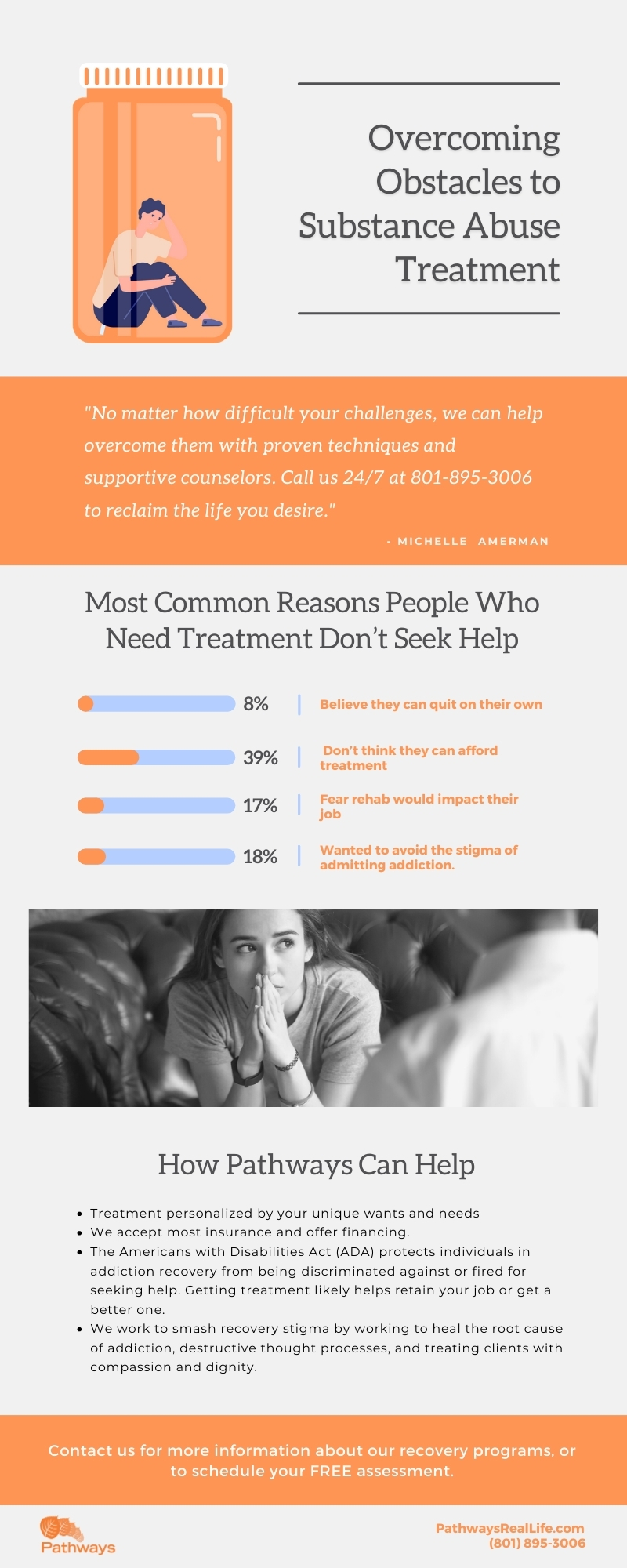Most people who need to seek substance abuse treatment don’t attempt to obtain professional help. There are typical obstacles that dishearten many people suffering from alcohol or drug addiction, causing them to avoid seeking treatment or doubt their likelihood of lasting success after rehab. In some cases, individuals face a combination of these barriers to entering a substance abuse program. But, every individual who needs alcohol or drug addiction treatment should be able and willing to receive it.
Although some people succeed in turning away from abusing drugs or alcohol with just support from friends or family, there are over 20 million individuals struggling with addiction in the United States who need treatment in a substance abuse center in order to overcome their dependency. In those cases, their addiction may be too extreme, or they may have a strong genetic predisposition, or there may be mental health factors or other issues which require help from rehab professionals.
Why Don’t People Who Need Rehab Seek Treatment?
It can be extremely difficult for some people to face the prospect of starting drug or alcohol rehabilitation treatments. Some have severe cravings or even withdrawal symptoms that can intimidate them from facing the process of overcoming their addiction. Others may try to hide their addiction, because of the stigma it bears in their community around them. These are just a few of the many reasons why people avoid starting treatment.
The voluminous report of the 2014 National Survey on Drug Use and Health, from DHHS’s Substance Abuse and Mental Health Services Administration (SAMHSA), offers data on reasons why people do not seek treatment for substance addiction (2011-2014). The research found that among the most frequent reasons people in need of rehab treatment did not seek help included:
- 8% said they believe they can quit using on their own.
- 39% did not think they could afford to go to rehab.
- 17% feared being in rehab would impact their jobs.
- 18% wanted to avoid the stigma of admitting addiction.
Overcoming Barriers To Addiction Treatment
In some cases, people don’t seek addiction treatment for a combination of reasons. They may believe they can’t afford treatment. Or, they might be too fearful of telling their employer they need to go into rehab. Maybe they’re worried about being absent from work, or a lack of childcare or they may feel unable to get help due to any one of many other concerns. Here are just a few of the most common examples of concerns people have about seeking treatment for substance abuse:
They Don’t Believe They Have a Serious Problem
Over a third of people with substance addiction believe they’re not addicted or that they can stop using drugs or alcohol whenever they want to, without help. They often don’t see the harm their behavior is causing to their important relationships, their employment, and other areas of their lives.
Recognizing their need for substance abuse treatment is the necessary awakening that enables them to turn toward a new life beyond addiction, starting with getting the help they need to free themselves from substance abuse and move on to a more fulfilling life.
They Believe Rehab Costs Too Much
Many people struggling with addiction don’t think they can afford rehab. Generally, drug addiction rehabilitation experts recommend a minimum of 90 days inpatient treatment in cases of severe substance addiction.
The good news is that these days many drug treatment centers base the cost of rehab on a person’s income. Some drug and alcohol rehab facilities also receive government funding, enabling them to reduce the cost of treatment for people seeking rehab.
They Can’t Leave Their Responsibilities
Over 75% of people with drug or alcohol addiction in the United States are afraid they will lose their jobs while they’re away in rehab. Sufficient time in rehab means a greater likelihood of long-term recovery success and less risk of relapse.
Fortunately, many employers today are supportive of their employees’ decision to obtain treatment for addiction and welcome them back to their jobs after they complete inpatient rehab. Alternatively, outpatient addiction treatment is an effective option for many people, and it makes it possible for them to avoid missing time on their jobs.
They Don’t Have Sufficient Childcare Resources
A serious issue for many individuals coping with addiction is the absence of adequate child care options. It can be a very tough decision to entrust the care of one’s child to another person. But, the choice to recover from addiction is the most important thing a parent can do for their child and herself or himself, making it the right decision in every case of substance addiction.
After all, the alternative is potentially allowing alcohol or drug addiction to cause job loss and loss of child custody. Recovering from addiction is the most practical way to avoid those outcomes and do your best for your child.
They’re Worried About the Stigma of Addiction and Rehab
Nearly 20% of individuals who do not seek addiction treatment say their worried about their reputation. They fear what their spouse, family, neighbors, coworkers, employers, and others in their community will think of them if they go into drug or alcohol rehab. They naturally fear social judgment, because addiction is stigmatized in the U.S. However, contrary to their fears, the majority of families and friends want their loved ones to recover from addiction and not go on suffering with it.
There Is No Treatment Program in Their Area
A serious obstacle to treatment for substance addiction is often the lack of treatment options. The need for rehab is accelerating more rapidly than new treatment facilities are opening throughout the country. In cities, rehab facilities often have lengthy waiting lists for admission, and in rural areas, people seeking addiction treatment are sometimes forced to travel many miles for treatment.
There are some effective alternatives, including seeking help from a person’s family doctor. They can attend support groups, and they can start in AA or Narcotics Anonymous while waiting to begin rehab.
Asking for the Help You Need Is the Smart Choice
There are countless reasons for not seeking treatment for substance addiction, but you don’t need to wait until things are much worse before you reach out and ask for the help you need. Addiction treatment and relapse prevention are more likely to be easier and more effective long-term when individuals seek the help they need before their addiction grows more severe.
Pathways Real Life Recovery, Sandy Utah
Pathways is an addiction recovery treatment center in Utah. We help people free themselves from the perpetual cycle of guilt and shame, so they can make the change they want in their lives. We treat every client with the dignity and respect every person deserves.
We’re focused on helping you restructure the system of beliefs that have kept you from loving yourself and made you a prisoner of your past. There’s no one-size-fits-all approach. Each client has a personalized rehab program that meets their vision and needs.
Our team of specialists includes a range of specialists, including LCSWs, LMFTs, MD specialists, Addiction Recovery Specialists, EMDR (Trauma specialists), and Self-Esteem
Experts, among other highly effective addiction treatment professionals. We strive to provide the most comprehensive drug treatment center Utah has to offer for our clients.
ALL members of our professional addiction treatment team are available 24/7, so your call will never be answered by a recording. You will always reach a therapist who will help you!
We can accept most types of insurance, and we offer help with financing.
For more information about starting rehab, or to schedule your free assessment, just call Pathways Real Life Recovery, Sandy UT, at (801) 895-3006, or leave a message online for a quick response.



